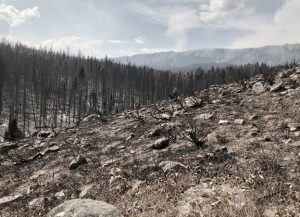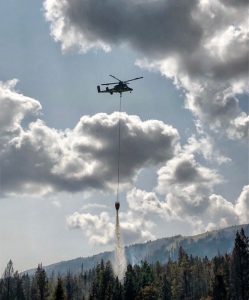
NAUGATUCK — The desire to fight fires can take people a long way. For one borough firefighter, it took him halfway across the country.
Naugatuck Firefighter Deven Yudelson, 27, of Burlington, returned this month after 18 days helping to battle wildfires in Montana.
Yudelson, who has been with the Naugatuck Fire Department for two years, took the Department of Energy and Environmental Protection’s wildlands fire course earlier this year. On Aug. 12, Yudelson received a call from the DEEP saying he had been chosen to be on a crew to fight wildfires and be prepared to leave at any moment. He shipped out two days later.
Yudelson said the first challenge was finding people to cover his shifts while he was gone.
“It’s tough to say, ‘I’m leaving at some point for 18 days.’ At that point they didn’t tell us you are leaving in two days. They just said be prepared to go,” Yudelson said. “I had to get guys to cover my shifts for 18 days and make sure everything was going to be squared away when I left.”
Yudelson said his fellow borough firefighters were happy to help him out since he was headed to fight wildfires.
“They think it’s awesome, so they bailed me out,” Yudelson said.
Yudelson and his crew were sent to Ennis, Mont. Ennis was surrounded by the Wigwam Fire and the Monument Fire, which burned a combined 10,000 acres, according to The National Wildfire Coordinating Group.
Yudelson said his crew did “mop up duty” on the Wigwam Fire.
“The fire had burned up this beautiful mountainside and hit a big meadow. The meadow was spotted with grasses and trees that weren’t burned. So every day, as the weather got hotter and dryer and the humidity starts dropping, trees would start torching because the stuff smoldering underground would catch the drying fuels on fire,” Yudelson said. “Our job was to go around and make sure all those spots were out and that wasn’t going to happen.”
Yudelson said the crew used the backs of their hands to see if any areas were still hot and smoldering. When any of the firefighters found a hot spot, they had to put it out without water, since water was in very short supply, he said.
“Basically you put gloves on, rub the stuff together and destroy all the ashes the best you can. Or, in a lot of cases, we would hike around and find mud, fill either our helmets or hands with mud, bring it back and rub the wet mud into the ashes,” Yudelson said.
In cases where the hot spots were too large, the crew called in helicopters to drop bucket loads of water on the area, Yudelson said.
Despite the hard work, Yudelson enjoyed his commute to and from the crew’s camp.
“Every morning going up the mountain pass we were driving through these beautiful rolling hills of Montana. It’s all grasslands. There were these massive herds of pronghorn,” Yudelson said. “There were herds of hundreds of them running around the fields. When you get to go to work in that type of landscape every day, it is pretty awesome.”

After nearly a week at the Wigwam Fire, the crew headed to Libby, Mont. to help fight the Golden Hill Fire, Yudelson said. The crew did similar “mop up” work, but also had to create fuel breaks to help protect nearby residential properties.
Creating a fuel break requires removing all the underbrush from the forest and leaving only the trees, then setting an intentional fire to destroy all potential fuel for the fire in the area, Yudelson explained.
“We burn up the hill away from the homes and create a black area which would make that area safe and protect those houses,” Yudelson said.
An average day fighting wildfires is very different from a day on the job in Naugatuck.
“We were working 16 hours a day every day,” Yudelson said. “Instead of getting off a firetruck and running up to a house, you are getting off a school bus with all your stuff on you back and hiking 3 miles to start your work day for the next 14 hours before having to hike 3 miles back out.”
“We have brush fires here in Connecticut. It is not completely uncommon. But out there it is a completely different animal,” Yudelson added. “They are absolutely massive. You are dealing with something a lot of times you can’t even see. You just know it is off in the distance somewhere and you are just fighting to stop it.”
Despite the long days and hard work, Yudelson is ready to do it all over again.
“I can’t wait to go again. I was hoping this year they would call us again, but it looks like it will be next year,” Yudelson said.













